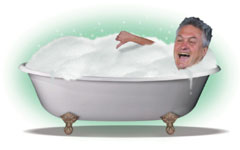sierraclub.org - sierra magazine - may/june 2009 - spout


Spout | Rant, React, Chat, Blather
Water on the Brain | Letters
Water on the Brain
(1) A man wearing a sweatshirt but no pants stares at the ocean. (2) A snowy slope gets imprinted with a face-plant. (3) Sharks glide overhead as filmmakers sip Anchor Steam beer. (4) Someday we "may need to go to Mars to go skiing," a MacArthur genius says. (5) In a gallery packed with landscape paintings and young women, a kayaker garners teary applause.
 I think of those scenes because just before they unfolded, Sierra received Bonni's letter (below) condemning bathtubs as wasteful. Looking for a simple answer, I contacted our own Mr. Green, a.k.a. Bob Schildgen. He confirmed the obvious: Baths consume more water than showers.
I think of those scenes because just before they unfolded, Sierra received Bonni's letter (below) condemning bathtubs as wasteful. Looking for a simple answer, I contacted our own Mr. Green, a.k.a. Bob Schildgen. He confirmed the obvious: Baths consume more water than showers.
The aforementioned scenes, however, reminded me that nothing about that seemingly most simple of substances--water--is truly simple.
I looked differently, for example, at (1) the waves sloshing against my ankles on that beach because I had read about the ubiquity of plastic pollution. (Speaking of different looks--you should have seen the one on my wife's face as we walked past that inexplicably pantless fellow.) The next weekend, (2) a snowboarding tumble delivered a stinging reminder of the hydrologic cycle we all learn about in grade school (evaporation, condensation, precipitation, etc.).
Then there was (3) the party at a waterfront aquarium with tubular overhead tanks to kick off the San Francisco Ocean Film Festival. The joys of and threats to all those seals, surfers, scuba divers, wetlands, ice caps, coral reefs, and sea slugs in the impassioned documentaries resonated a few days later as I listened to (4) Peter Gleick, president of the Pacific Institute. Even as robotic vehicles record snowfall on Mars, climate change is altering almost everything about the human relationship to water here on Earth, the MacArthur fellow told his audience. "The hydrologic cycle," he said, "is the climate cycle."
I like Gleick's informed optimism. His message is that there are good solutions to the mess humanity has made of its water, from the technological (building better treatment plants; rethinking the use of aquifers) to the political (establishing regulatory jurisdictions that acknowledge the complexities of a resource that falls from the sky, becomes a part of us all, and eternally circles the globe).
I heard echoes of that theme in (5) an art gallery brimming with landscapes of dry, oak-covered hills. Champion whitewater kayaker Beth Rypins was there to help raise funds for GirlVentures, a nonprofit that introduces adolescent girls to outdoor adventure. Overcome your fears, Rypins told them, and you can face any challenge. The girls listened closely to this woman who kayaks waterfalls. Someday, when others are panicking about impending drought, one of those young women may develop an economical desalinization process.
"Water," Gleick noted, "is connected to everything we care about." Conserving it, therefore, is important. Enjoying it is too. So come on, Bonni and Mr. Green--not even an occasional bubble bath? --Bob Sipchen, editor in chief
Letters
TUB OF WOE
Love the Club, the magazine, the ideas and ideals. But I was dismayed to find a picture of a bathtub in the green home article ("This Green House," January/February). Shouldn't we set an example by picturing a water-saving shower, not a great big wasteful tub?
Bonni M. Weinstein
Carmel, California
BIKES VERSUS HIKES
Peter Frick-Wright states that "research shows that mountain bikers and hikers do about the same damage to trails" ("Because It Hurts," March/April). In the half century that I have been a hiker, I have seen gentle trails turned into swamps by mountain bikes. They are still "the enemy."
Richard Wolff
Montclair, New Jersey
OMAN AND WOMEN
In "A Sandy Place to Stop Thinking" (March/April), regarding a family in Oman, Tracy Johnston chose to barely address the oppression of women in a country whose justice system is founded on sharia law and whose cultural norms reduce women to chattel.
Sarah North
Brooklyn, New York
Tracy Johnston's "A Sandy Place to Stop Thinking" is a beautiful testament to the virtue of simplicity; a wise, unpretentious perspective that bridges cultural divides.
Ray Janes
Rockport, Maine
BAD MAGAZINE!
In these difficult days it is hard for me to see my donation going for a vapid glossy magazine. What's with the poodle with pink goggles?
Niels Wolter
Madison, Wisconsin
CORRECTIONS
In "Activism 101" ("Bulletin," March/April), the price of the Sierra Student Coalition training programs was incorrect; they cost $200 to $300.
"Killing King Coal" (March/April) gave the wrong location of a proposed coal plant the Sierra Club attempted to halt; it is in eastern Utah. The timeline, "A History of American Coal," misidentified the IWW; it is the Industrial Workers of the World.
CONTACT US
E-mail sierra.letters@sierraclub.org or write to us at 85 Second St., 2nd Floor, San Francisco, CA 94105. Please include your name, city, and e-mail address or daytime phone number. Letters may be edited for length and clarity.
Mr. Green photo: Lori Eanes; bathtub: John Euland